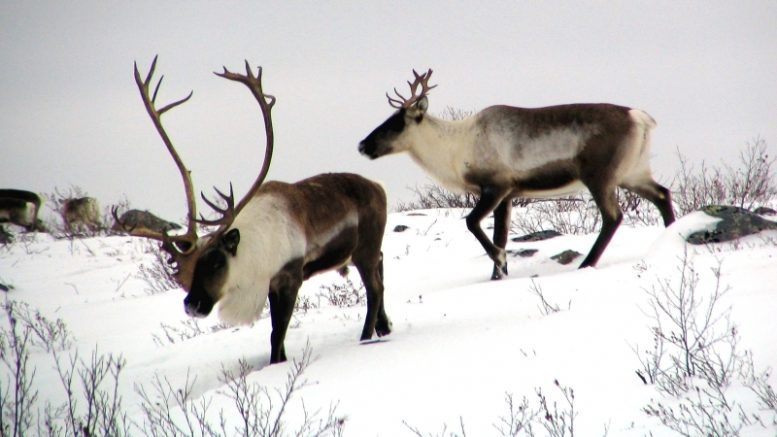Earl Evans is calling on the Indigenous and territorial governments to work together and educate harvesters on respectful hunting practices.
Evans, the chair of the Beverly and Qamanirjuaq caribou management board, shared his recent experience of travelling the Tibbitt to Contwoyto ice road where he says he saw unsafe hunting practices, multiple wounded animals and lots of wasted meat.
“Somehow, we got to get a message across to these people that we need responsible hunters out there,” said Evans. “Because this is not right. It’s disrespectful and the animals are in serious decline.”
Evans said while he was out on the ice road he saw one hunter on a snowmobile chase a herd of hundreds of caribou and wound multiple animals.
As chair, Evans explained his concerns lie especially with the Beverly herd as there is a lot of mixing this year with the Bathurst herd. Under current regulations, harvesters are not allowed to hunt Bathurst caribou.
Evans said in his 55 years of experience, he’s noticed illegal and disrespectful hunting “getting worse.”
“When I first hunted caribou, it was not like that. People hunted with dogs and caribou access wasn’t so readily available. There was less animals being taken and taken in a more respectful way. Every piece of meat was taken and used up. Now you can drive down the ice road with your cowboy boots on, shoot caribou out your window, sometimes.”
Shane Thompson, minister of Environment and Natural Resources (ENR), said there have been more charges related to illegal hunting this year.
So far this winter, “We have or are currently investigating the illegal harvest of over 50 caribous,” he said. The minister added that by this time last year there were fewer than 10 incidents of illegal harvesting.
Thompson said the department has increased patrols along the road.
Lee Mandeville, a conservation officer with ENR, said the increased patrols have helped but also expects issues to continue with warmer weather.
“People get more encouraged to head out and hunt,” he said. “We just have to keep working together.”

Left to right: ENR Minister Shane Tompson, ENR Officer Lee Mandeville, BQCMB Chair Earl Evans. (Photo courtesy of Government of the Northwest Territories)
Mandeville also said officers have been working closely with communities to get the message out to hunters and, when necessary, help in investigations.
Many infractions in the area along the ice road involve harvesters hunting within the Mobile Core Bathurst Caribou Management Zone. Mandeville said one count of hunting a single animal within the zone is a $1,150 fine.
Thompson said the department did not have any plans in increasing the zone of the no hunting zone to address the disrespectful hunting practices. He added that hunters can stop in at one of ENR’s check stations to have the zone downloaded onto a GPS to ensure they remain outside.
CKLB asked whether the proposed Slave Geological Province Corridor may exacerbate these kinds of disrespectful hunting practices.
“I think that’s very hypothetical,” said the minister. “We are going to be doing the environmental assessment… But I guess the big thing is that what we’re learning from this road here, will help us move on to if that (project) becomes reality.”
The minister said the department was also working through schools to educate young harvesters about hunting and conservation. However, when it came to conservation officer training at Aurora College, Evans said it needed to get back to “common sense” teachings.
“All the good practices of looking after the environment, they’re slowly getting away from that,” said Evans. “We have to get that element back into the schools… More on-the-land conservation.”
For Evans, advice for harvesters is simple: “Enjoy yourself and be proud of what you’ve done when you get home.”
According to ENR’s latest population surveys the Bathurst caribou herd has 8,200 animals, Beverly has 103,000, and Qamanirjuaq has 288,000.
Francis was a reporter with CKLB from January 2019 to March 2023. In his time with CKLB, he had the immense pleasure and honour of learning about northern Indigenous cultures.





